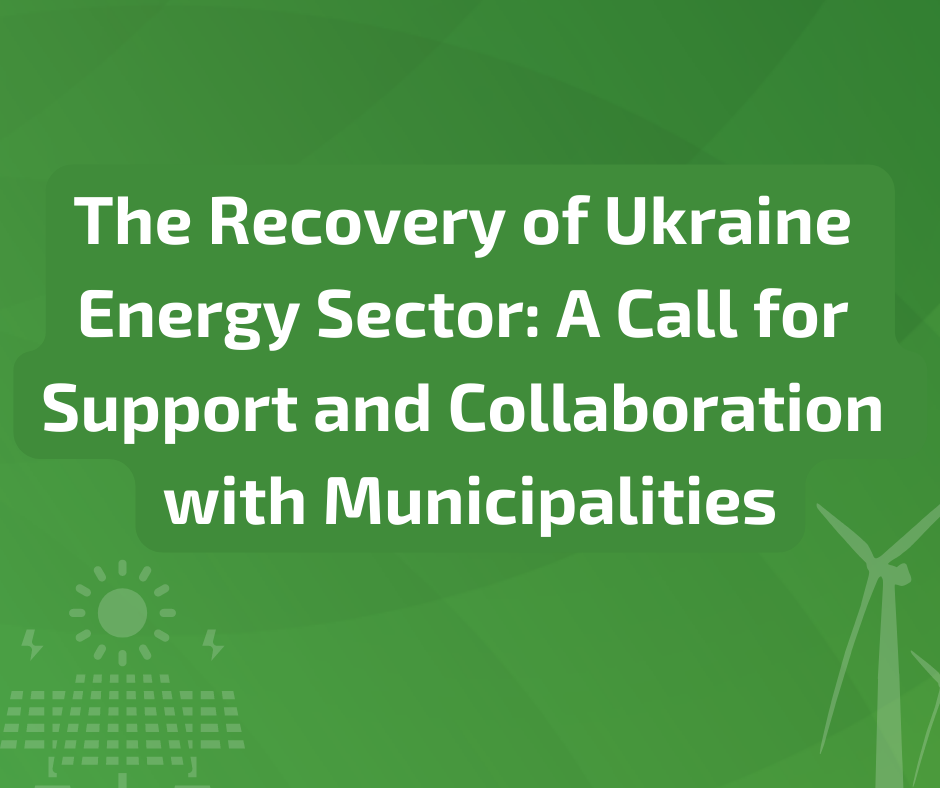The post-war sustainable recovery of Ukraine has started. It is time for international partners to cooperate with Ukrainian municipalities and explore various models to finance clean energy projects.
This brief outlines the current state of play in the field of green energy recovery in Ukraine. It provides recommendations to foreign governments, international partners, and national authorities to partner with local communities and rebuild the energy sec-tor. The main objective is to boost local communities’ energy resilience by providing loans, equipment rental, leasing, grants and co-financial mechanisms.
Reconstruction has already begun and cities are ready to rebuild green
Ukrainian municipalities have not waited for the end of the war to rebuild and provide water, heat, electricity, transport, medical care and other vital services to the population. The recovery is at an active stage of implementation and the main work is happening at the municipal level.
The energy sector is of particular importance and offers a set of advantages to start with the immediate reconstruction: projects in renewable energy sources and energy efficiency for municipal sector infrastructure are already bankable. They help to increase resilience of communities in war time during power outages and lead to decentralisation. Despite all challenges induced by the war, such as the migration of inhabitants and work forces, as well as the lack of resources, municipalities are conscious of the necessity to “build back better”. They know that they have to use sustainable approaches and to modernise their infrastructure.
The rise of decentralised renewables for reconstruction
Ukrainian communities have recently endured a challenging winter due to the impact of Russian attacks, which led to widespread destruction and extended power outages. This difficult period has underscored the importance of renewable energy sources (RES) in ensuring the continued operation of critical infrastructure such as water supply and hospitals.
Despite the ongoing war, Ukrainian environmental NGOs such as Ecoclub, Energy Act for Ukraine, Ecoaction, and Greenpeace have successfully partnered with local communities and various stakeholders to install solar power plants, demonstrating the feasibility and attractiveness of renewable energy projects in Ukraine. In 2022, a study conducted by Ecoaction demonstrated that more than 80% of respondents (to the study) agreed that ‘Ukraine should reduce the use of fossil fuels (coal, oil and natural gas) as much as possible and increase the production of electricity from renewable energy sources.’
Renewable energy projects have proven financially viable, with solar power plants at hospitals and water utilities expected to recoup their investment within three to five years. While RES may not currently serve as the sole backup power supply option, they have a potential to significantly contribute to the resilience and functioning of communities during disruptions in grid-connected power supply. Furthermore, when electricity is available, RES can help address pressing issues by reducing electricity costs, thereby retaining more funds within communities for local development.
The progress made in deploying RES in communities can be attributed to various factors, including political will among local authorities, grant support from foreign donors, and experience and knowledge of the private sector, as well as higher energy prices for public institutions.
Challenges and solutions for municipalities
Some of the main obstacles to RES installations are:
- insufficient local budget funds,
- need for substantial upfront investments,
- fear of violating regulatory requirements,
- low awareness among local decision-makers.
To foster the development of RES in Ukrainian municipalities, it is crucial to establish an enabling environment that provides municipalities with access to financial mechanisms, introduces new development systems such as net-billing for public institutions, and includes capacity-building programmes about sustainable energy resources. This environment should also involve standardised documentation packages, showcase successful cases of community recovery exemples and promote public-private partnerships in the RES sector.
Foreign governments and the Ukrainian authorities are respectfully urged to support the ongoing decentralisation reform. They should assist Ukrainian communities in their RES development. This includes integrating local government capacity-building efforts on sustainable energy into all green recovery activities and providing support and risk insurance for foreign investors’ investments in Ukraine.
Recommendations
To the G7 Coordination Platform and IFIs:
- Establish risk insurance mechanisms. These mechanisms should include insurance of risks related to (1) inflation, (2) changes in currency rates, (3) changes in energy pricing, (4) war-related physical damages to energy facilities. Both sides should be insured – municipalities and lenders/donors.
- Create financial instrument(s) that Ukrainian municipalities will have direct access to without the need to obtain approval from the national authorities. This instrument should combine grants and soft loans.
- Create low-interest loans in Hryvnia (Ukrainian currency, UAH) for municipalities to implement reconstruction and modernisation projects during the war. The financing should be linked to the targets on strengthening energy resilience, sustainability, greenhouse gas emissions reduction etc. As an option: establishment of a credit line in a state bank dedicated to financing renewable energy projects in municipalities such as the successful credit lines of the state-owned Ukrgasbank financing energy efficiency projects in the residential sector.
- Ensure prompt and efficient decision-making process to support municipalities. The time between the project application and its approval should be reduced from years to months. Technical assistance should be provided to municipalities for project preparation.
- Scale down loans available to municipalities, as not all municipalities have the capacities to absorb large sums of money. Support of collaborative projects for several small towns and support to local project offices should be considered.
To governments willing to support Ukraine’s green reconstruction:
- Support of establishment of low-interest loan programmes for Ukrainian municipalities. Explore different financing models for RES, such as loans, equipment rental, leasing, and co-financing.
- Create capacity-building programme(s) for Ukrainian municipalities in the field of renewable energy and energy efficiency that could be linked to financial support instruments.
- Appoint an envoy/ambassador on Ukraine’s Reconstruction (such as in Czechia and Slovakia) who could establish contacts with regional and municipal authorities, also keeping in mind the EU’s and Ukrainian green agendas.
- Establish direct cooperation with municipalities. Consider cooperation options on reconstruction between a country and a Ukrainian city or region (such as Denmark – Mykolaiv cooperation), and city-to-city cooperation.
- Ensure civil society participation through new projects and programmes empowering active involvement, implementation and leadership by Ukrainian stakeholders. Direct support of local stakeholders could help ensure effective use of international aid.
To the Ukrainian government:
- Establish a supportive framework for municipalities to design and implement renewable and energy efficiency projects during the war. The framework should include legal, financial and institutional aspects, and support establishment of connections between municipalities and foreign donors and institutions. Government agencies should provide support to municipalities in the form of training, resources, and guidance to help them improve their capacity to absorb funds. They could also review and streamline the funding application process to make it easier for municipalities to access funds.
- Provide political risk protection and investment guarantee schemes for new investments into sectors important for Ukraine’s Green Hub of Europe ambition, such as production of renewable energy equipment, energy efficient materials, heat pumps etc.
- Introduce new mechanisms for prosumers (including net-billing) for public institutions, so that excess solar energy produced on public buildings could be sold to the grid at a wholesale price.
- Ensure civil society’s and regional municipalities’ involvement in the green reconstruction of Ukraine programming and implementation.
Existing success stories from communities
Hostomel community, Kyiv region
The Horenka village hospital was hit by a shell in the beginning of March 2022. As a result of the attack the windows were shattered, the outer wall and roof were partially damaged as well as the heating system. From May 2022 to January 2023 this hospital was reconstructed and modernised using the latest renewable and energy efficient technologies. A heat pump was added along with the old fossil gas heating system, to provide an alternative source of heating during the winter. A solar power plant with storage capacity was also added in order to allow uninterrupted work of the hospital during power outages.
“We understand the huge potential of renewable technologies. Since their installation in Horenka hospital, we have been able to provide services to our citizens no matter the circumstances and we have saved money which will be invested in other reconstruction projects, and we became energy independent.” said Olena Yuzvak, head of the Hostomel Center for primary medical and sanitary care.
For more information, please contact:
Denys Tsutsaiev, Greenpeace CEE
+380685944100 (whatsapp, signal, telegram)
dtsutsai@greenpeace.org
Coal mining towns, Donetsk, Dnipropetrovsk, Lviv and Volyn regions
A successful just transition of coal towns can serve as an inspiring example of a green reconstruction for other communities in Ukraine. Despite the challenges caused by the russian invasion and the need to focus on survival, the leaders of coal communities are still determined to just transition and are focused on continuing the work started before the invasion. Moreover, through the meetings with representatives of European Commision and international financial institutions, they formed a vision for including just transition as an essential part of the country’s green recovery. For that, the community leaders have united in a working group to develop and exchange on projects for just transition while recovering their communities and setting ground for people to return even to the most affected communities.
“Pokrovsk community will develop not simply a Recovery Strategy, but a Green Community Recovery Strategy, which will undoubtedly be based on the experience gained during the development of the Transformation Strategy of Coal Towns of Donetsk Region 2030. The strategic areas we have previously considered include energy efficiency, energy saving, human capital, small and medium-sized business development, investment attraction and economic transformation,” said Oleh Frolov, Pokrovsk military administration.
For more information, please contact:
Anastasiia Bushovska, Ecoaсtion
+380636135540 (whatsapp, signal, telegram)
ab@ecoaction.org.ua
Chervonohrad, Lviv region
Chervonohrad community is actively planning for their just transition. In 2021 Chervonohrad (Lviv region) and Myrnohrad (Donetsk region) were announced to become pilot just transition projects in Ukraine. The russian invasion started and stalled many activities, but quite soon Chervonohrad returned to their work on just transition plan with participatory consultations. There are already practical steps performed – for example, the city created the educational program “Electrician for installation and repair of solar stations” and they are planning for more.
“We are 15 kilometres from the border with the European Union, so we don’t have the problems that most other coal mining towns have because of the war. It’s quiet and calm here. I think we will succeed with just transition. And when the war ends and de-occupation takes place, other mining communities will have access to tested options and algorithms of actions – what to do and what not to do (what we learned, what mistakes we made, and what did not work).
We need to replace mining specialties to expand the community’s profile. People with law or economics degrees should not have to go to a mine to work there. And if you get a new technical specialty, particularly in the field of renewable energy, then new prospects open up. But there is also a risk – we are at 15 kilometres of the border [with EU] – some inhabitants can potentially leave. In Europe, there is a great demand for the installation of solar panels. Therefore, we need to create new opportunities here, locally,” said Andrii Zalivskyi, Mayor of Chervonohrade people.
For more information, please contact:
Anastasiia Bushovska, Ecoaсtion
+380636135540 (whatsapp, signal, telegram)
ab@ecoaction.org.ua
Zhytomyr, Zhytomyr region
The ambition of the city of Zhytomyr is to switch to 100% renewable energy by 2050. Zhytomyr has repeatedly suffered from russian shelling. Early June, a blast wave blew out windows in Municipal Enterprise “Hospital No. 1” of Zhytomyr City Council. In autumn 2022, critical infrastructure operated under power outages. The hospital’s buildings were disconnected from the power grid. The outages occurred several times and lasted from two to five hours each time. A backup diesel generator provided electricity to one part of the hospital’s electrical equipment., Patients treated at the hospital were in danger.
Local authorities have looked for alternative energy sources to secure critical infrastructure such as hospitals. This year, on June 15, NGO Ecoclub in partnership with the Czech NGO Nesehnuti and Solsol is installing a solar power plant on the hospital’s roof. After the installation, the hospital will be able to replace part of its electricity consumption with renewable energy generation. After the installation of the solar power plant, the hospital will be able to replace part of its electricity consumption with renewable energy generation.
“Zhytomyr is becoming an attractive place for investors of the renewable energy sector. It is creating new jobs and strengthening the local economy. By installing solar power plants on hospital buildings, we are not only reducing the need for medical institutions to buy electricity but also sending a clear signal that solar power and renewable energy will continue to develop in our community. We are open to cooperation, exchange of experience, and new ideas to build a sustainable future,” said Serhiy Sukhomlyn, Mayor of Zhytomyr.
Additional information:
In 2021, about 3,600 people were treated at the therapy department building in the “Hospital N°1” in Zhytomyr. The latter serves the Korolyovskyi district of Zhytomyr, which has a population of about 118 000 people.
In addition, the building directly employs 260 medical, engineering, and technical staff and houses the hospital’s admission, cardiology, therapeutic, and neurology departments.
For more information, please contact:
Julia Guziy, communication manager of NGO Ecoclub
+380 (68) 758 98 89 | julia@ecoclubrivne.org
Oleksandr Honcharuk, Department of Economic Development of Zhytomyr City Council
+380 (96) 945 23 37, olex.goncharuk@gmail.com
Zviahel, Zhytomyr region
Ukraine’s green recovery is now the norm in Zhytomyr. Funds received to install solar panels on the hospital by the NGO Ecoclub is one example among many others.. It guarantees energy security for the medical facility and helps save money on utility bills every year. As a result, the sick and wounded will continue to receive medical care regardless of russian attacks.
Due to the installed solar power plant, the hospital will be able to save up to UAH 300 thousand a year on electricity services at the current electricity tariff. The planned savings will allow the hospital to purchase the necessary medical equipment, as well as medicines, and to repair equipments.
The city municipality will also install solar power plants to secure energy for the water utility and for a kindergarten.
“Diesel generators are not profitable. They are not suitable long-term solutions to our problems. They are expensive and damage the environment. Solar energy gives us power for free. We want to keep funds available for other purposes and create more comfortable conditions for the work and life of the members of our communities,” said Mykola Borovets, Mayor of Zviahel community.
“Alternative energy sources, such as solar power plants, will help us to significantly save money. We are now operating a pilot project, and in the future we intend to equip water supply company with solar energy too. I am sure that this is our first important step towards the community’s energy independence,” said Iryna Gudz, deputy mayor of Zviahel community.
For more information, please contact:
Julia Guziy, communication manager of NGO Ecoclub
+380 (68) 758 98 89 | julia@ecoclubrivne.org
Yuriy Savych, Head of the Department for Support of Public Initiatives and Energy Efficiency at Zviahel City Council, +380 (97) 748 83 95 , nvgi@ukr.net
Additional information:
Voznesensk, Mykolaiv region
In 2020, in cooperation with the NGO Ecoclub and the Norwegian Embassy, the Voznesensk water utility received a 50 kW solar power plant.Earlier this year, another 150 kW solar power plant was built to ensure that the population would not be left without water in case of emergency outages.The solar power plant currently covers about 45% of the pumping station’s electricity needs. Even in the event of a complete blackout, it will be able to power the water utility for a while and provide residents with water.
“The development of renewable energy sources is a priority for Voznesensk. This is not only a contribution to environmental protection, but also energy security and little energy independence for the water utility,” said Yevhen Velychko, Mayor of Voznesensk.
For more information, please contact:
Julia Guziy, communication manager of NGO Ecoclub
+380 (68) 758 98 89 | julia@ecoclubrivne.org
Andriy Makoekod, Deputy Mayor of Voznesensk
+380 96 509 25 70
More information:
Irpin, Kyiv region
Hybrid Solar System for Irpin Academic Lyceum “Mriya”
Irpin city was occupied and actively shelled from February to April 2022 which led to significant destruction of the city’s infrastructure. Irpin Academic Lyceum “Mriya” was damaged but it recovered fast and organised offline courses in September 2022. The Energy Act for Ukraine Foundation equipped the school with a hybrid solar system consisting of a rooftop power plant of 20 kW and 49 kWh energy storage system. The project was implemented with the German Solar Association (BSW-Solar). Its members provided the following equipment: IBC SOLAR, HOPPECKE Batterien, SMA and Q CELLS, with the participation of a RES company member of BSW called BayWa r.e.
“I am very pleased that this first project is implemented in Irpin. The city has suffered great damages and was severely destroyed. Almost every school and kindergarten was destroyed. There are now about a hundred schools equipped with solar panels in the region of Kyiv., This source of energy is the future. We are ready for cooperation, and to respond very quickly to all challenges. We are grateful for the support we received from international donors,, from all who are helping Kyiv region to recover,” said Zhanna Osypenko, Deputy Head of Kyiv Regional State Administration
For more information, please contact:
Anastasiia Vereshchysnka, Partnerships Manager at Energy Act for Ukraine Foundation, a.vereshchynska@energyactua.com
+380677245910
Dubno, Rivne region
Dubno is a city in the region of Rivne. It is actively implementing sustainable projects at the community level. One of them is the installation of a solar power plant for a local hospital. Funds for this project were obtained through the NGO Ecoclub in cooperation with the Embassy of the Federal Republic of Germany. The city is co-funding this initiative. The capacity of the solar power plant is 43.6 kW.
The installation of solar power plants is crucial for the safety of patients and medical staff. During emergency or planned power outages, thanks to solar power the hospital equipments that require uninterrupted power supply will continue to function and save lives.
“The hospital will increase its level of energy sustainability and “independence” from emergency power outages. It will also help to save money by reducing the cost of electricity. The saved funds can be used to improve the healthcare facility, and purchase medicines or equipment,” said Ihor Moskaliuk, Deputy Head of the Department of Economics and Property of Dubno City Council.
For more information, please contact:
Ihor Moskaliuk, Deputy Head of the Department of Economics and Property of Dubno City Council
+380 (99) 208 47 15, ekon@dubno-adm.rv.ua
Additional information:
Sumy, Sumy region
The region of Sumy is still suffering from constant russian shelling. The local community is using its own energy supply, independent from fossil fuels. In January 2023, Sumy joined the European initiative called the “Covenant of Mayors” and committed to reducing its emissions by at least 35% by 2030.
“Developing renewable energy sources and implementing sustainable solutions in Sumy is a priority for us. This is our energy security and independence from fossil fuels. We are currently planning to build three solar power plants – for the children’s hospital, the city clinical hospital, and a greenhouse with Red List plants. We also plan to install solar power plants for trolleybus and water utilities,” said Oleksandr Lysenko, Mayor of Sumy.
For more information, please contact:
Maryna Dranichenko, Head of the Department of Ecology, Energy Saving and Energy Payments at Sumy City Council ; maryna132314@gmail.com
Additional information:
The Recovery of Ukraine Energy Sector. Brief (132 downloads ) The Recovery of Ukraine Energy Sector: A Call for Support and Collaboration with Municipalities (137 downloads )The material is published within the framework of the project “Closing the Loop: A Just Energy Transition Designed by Cities and Regions” with the financial support of the European Union. Its contents are the sole responsibility of the NGO Ecoclub and do not necessarily reflect the views of the European Union.











